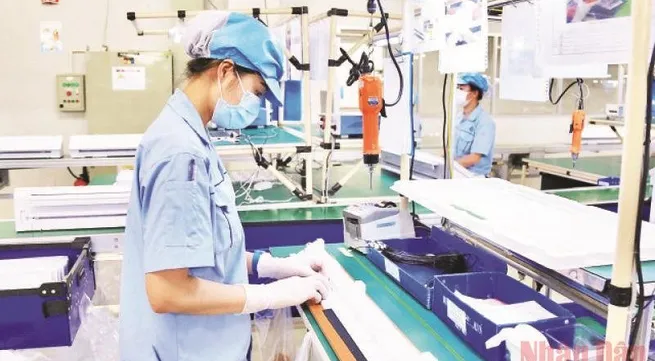Efforts made to help labour market recover sustainably

Statistics released by the General Statistics Office showed that the labour market recorded a gradually recovery in the first quarter of 2022 along with the recovery momentum of the economy.
Indexes on labour force, the number of employees, and average monthly income all increased compared to the previous quarter and the same period in 2021. The unemployment rate in the working age population, though still high compared to the same period in 2021, has decreased. Notably, two years since the outbreak of COVID-19, the labour force in the service industry has increased significantly thanks to the strong recovery of tourism, accommodation, catering and aviation industries and the completely open-door policy.
Of the current total of 50 million employed workers, there are 19.4 million employees in the service sector, accounting for the largest proportion (38.7%), a sharp compared to the previous quarter. This data is of interest to the service sector, which includes industries that were first and directly affected by the COVID-19 pandemic but recovered last, leaving salaried workers severely impacted both in terms of employment and income.
Moreover, this is also an area that creates many jobs for the society, so when the employment situation of the service sector recovers, it will be the last piece reflecting the revival of the whole socio-economic life.
Another positive signal must also be mentioned is a strong improvement in workers' incomes. In the third quarter of 2021, the labour market hit the bottom with unprecedented difficulties, causing the average income of workers to descend steeply to only 5.2 million VND per month, however it has now increased to 6.4 million VND per month, the highest increase since the COVID-19 pandemic.
The trend of increasing income occurs in all three economic sectors, including labour in industry and construction; agriculture, forestry and fisheries; and services, especially in urban areas. With the positive changes taking place, the pain of the labour market has somewhat calmed down. Although it has not been possible to return to the state like before the pandemic, at least, the underemployment situation as a result of the waves of reverse migration occurring continuously in the second half of 2021, with higher rates of underemployment in urban areas than in rural areas, is no longer a concern. Instead, the situation has returned to the situation commonly observed in the country, with the trend of the underemployment rate in rural areas being higher than in urban areas.
It is forecasted that in 2022, the COVID-19 pandemic will continue to negatively impact more than five million workers. The recovery of the labour market is not really sustainable, the loss of jobs and incomes of workers will cause spending to be tightened, leading to a decrease in sales of goods and services, affecting the ability of maintaining business of enterprises, thereby affecting the entire economy...
Therefore, in order to help the labour market to recover sustainably, it is necessary to continue to improve institutions, support the recovery, and develop the labour market and employment, considering this as one of the top priority tasks for economic recovery. Specifically, solutions to maintain the workforce should be devised, especially in industrial parks, export processing zones and growth centres, in order to strengthen measures to retain employees who are working, avoid disruption of the supply chain of labour sources for production and business of enterprises, as well as support workers to get loans for job creation from the national fund of employment assistance…
Tags:





